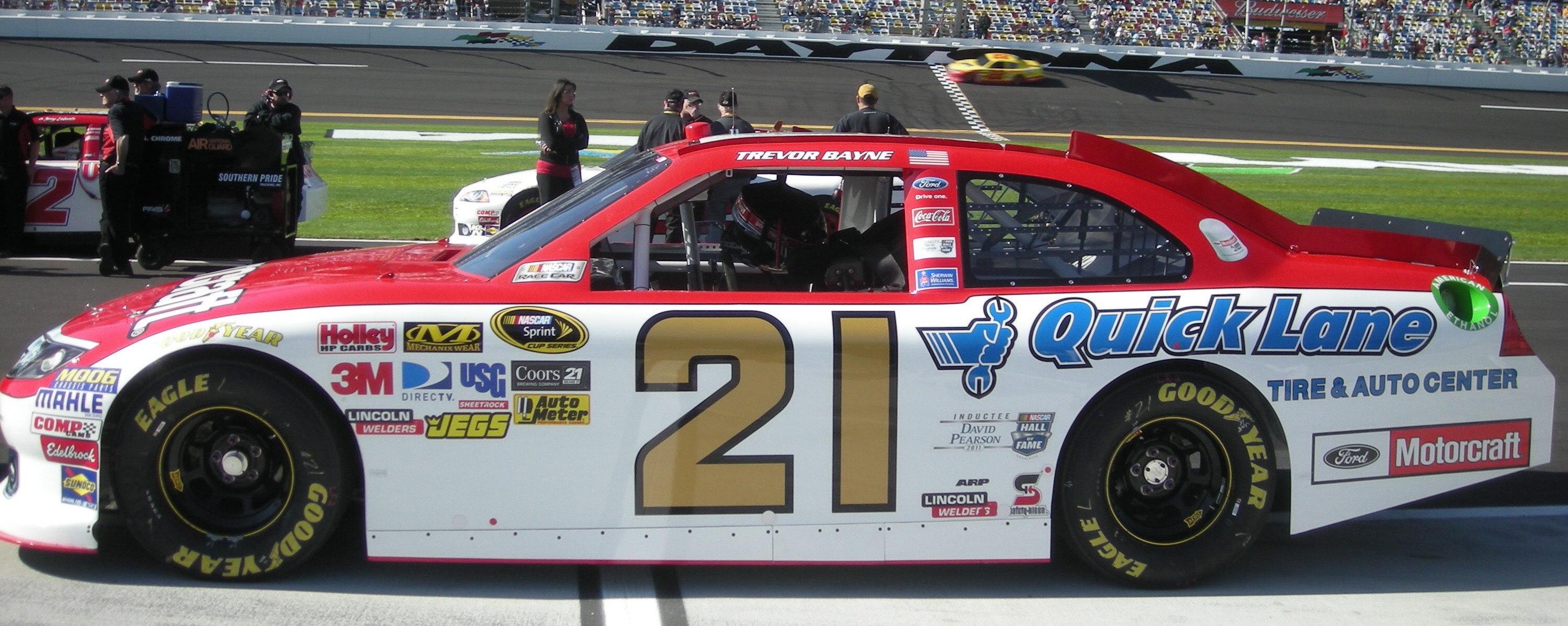by Robert E. Kozak (Advanced Biofuels USA) Part II: An Interview with Mike Lynch, Managing Director of NASCAR’s Green Initiative
 When we met with Mike Lynch last week at Daytona Speedway we spoke with him about some of the controversies, such as international indirect land use change (ILUC), that have arisen around ethanol and how NASCAR would respond.
When we met with Mike Lynch last week at Daytona Speedway we spoke with him about some of the controversies, such as international indirect land use change (ILUC), that have arisen around ethanol and how NASCAR would respond.
He said everyone at NASCAR understood they were entering a world where a debate was going on. He said NASCAR’s response would be to rely on facts - scientific facts and technology facts, and NASCAR would defer to experts to present them.
As a primary example for this approach, Mike cited the EPA RFS2 decision on corn ethanol. He said that decision facilitated NASCAR’s move to E-15 since the EPA decision said corn ethanol had a beneficial greenhouse gas emissions effect. (And yes that sentence did say EPA and NASCAR were on the same side of an environmental issue.)
 Mike also pointed out that Sunoco, their official fuel supplier, understood the implications of the EPA RSF2 finding on E-15 in NASCAR. He thought the combination of the finding with the publicity of using E-15 in NASCAR would help drive Sunoco’s efforts to reduce the amount of non-renewable energy, coal or natural gas, needed to produce ethanol. Showing that ethanol production could be more energy efficient would increase the GHG benefits of Sunoco’s corn-ethanol.
Mike also pointed out that Sunoco, their official fuel supplier, understood the implications of the EPA RSF2 finding on E-15 in NASCAR. He thought the combination of the finding with the publicity of using E-15 in NASCAR would help drive Sunoco’s efforts to reduce the amount of non-renewable energy, coal or natural gas, needed to produce ethanol. Showing that ethanol production could be more energy efficient would increase the GHG benefits of Sunoco’s corn-ethanol.
Are folks open to hearing facts? Mike asked. He thought NASCAR fans would be. He thought they would be able to distinguish between facts and agendas if the facts were “referenceable” and honestly presented.
We asked Mike about the role of the media in the E-15 story. He said while the NASCAR press corps is used to covering the personalities and business of NASCAR, he thought their understanding of the history of NASCAR as well as their “openness and thoughtfulness” would allow them to give E-15 and biofuels a fair hearing. As for the outside media, Mike said NASCAR would be responding to questions with fact based answers and would not get into tit-for-tat arguments.
Mike went on to say that NASCAR’s contribution to the biofuel debate would be as a place for people to discuss the topic. In addition, the races themselves would produce results that NASCAR could stand behind, which would add more facts on the use of E-15.
(Editor’s note: Probably the strongest argument in favor of E-15 produced by the Daytona NASCAR races was that its use wasn’t a story. As Dale Earnhardt Jr. said, “the switch was seamless.” By contrast, the repaving of the speedway, which seemed straightforward, created the new “two-car” drafting style, controversy over the 200+ mph speeds, and a flurry of rule changes. This was the story that dominated fan conversion, media coverage, and resulted in a wild Daytona 500 with a historic finish.)
Making E-15 Happen at NASCAR’s Premier Event: The Daytona 500 NASCAR has a history of slow methodical technological transitions. For instance when the “Car of Tomorrow” was introduced several years ago, its first race was at mid-season and using it was optional. It wasn’t until the second season that all teams were required to use it for all races.
With that history in mind, we asked Mike why NASCAR was taking the risk of introducing E-15 at the Daytona 500. Not only is the Daytona 500 the first race of the year, but it is their showcase event. Their “Super Bowl” if you will. It attracts their largest television audience (8.7 rating and a 20 share this year) and sets the tone for the rest of the season’s popularity.
 Mike admitted that introducing E-15 at Daytona did involve risks and that NASCAR and its stakeholders; racing teams, manufacturers, and suppliers were a very methodical group about making changes in the spotlight. But, NASCAR felt the change to E-15 was important enough to introduce it at the Daytona 500 rather than sometime in mid-season. He called E-15 “a bit of a capstone” for their Green Initiative. And he added that NASCAR does lots of development “off the radar” before anything is introduced.
Mike admitted that introducing E-15 at Daytona did involve risks and that NASCAR and its stakeholders; racing teams, manufacturers, and suppliers were a very methodical group about making changes in the spotlight. But, NASCAR felt the change to E-15 was important enough to introduce it at the Daytona 500 rather than sometime in mid-season. He called E-15 “a bit of a capstone” for their Green Initiative. And he added that NASCAR does lots of development “off the radar” before anything is introduced.
With some development work already done, they felt the 2010-2011 offseason was long enough to implement the changes. They could, as Mike said, go down the learning curve in time for the Daytona 500.
Mike gave David Hoops of NASCAR’s technical staff the majority of the credit in pulling this off. He said David worked closely with Sunoco on the transition which included revising the fueling logistics at all of the tracks NASCAR would race on during the year.
Besides talking about the details of introducing E-15, we had a chance to hear Mike’s thoughts on some more general issues that apply to biofuels and other “green” industries.
What Makes a Successful Green Program? Mike’s formula for “green” to work means it must be a long-term business. If not, “green” is seen as being subsidized or as a science project. For NASCAR, this means getting stakeholders together to build businesses around the green initiative that would benefit all NASCAR stakeholders.
 Mike said he sees some of this in the use of biodiesel by teams and media for stationary source generators. He called it an organic thing coming from the stakeholders, implementing on their own. He thought it was a good example of the Green initiative causing stakeholders to join in rather than spectating or going in another direction.
Mike said he sees some of this in the use of biodiesel by teams and media for stationary source generators. He called it an organic thing coming from the stakeholders, implementing on their own. He thought it was a good example of the Green initiative causing stakeholders to join in rather than spectating or going in another direction.
New Green Marketing Opportunities Mike said biofuels, as well as non-fuel green initiatives will be part of a new comprehensive marketing stream. He said NASCAR is producing new brand-marketing image spots with drivers that will include E-15.
I asked him half jokingly when would there be the “Official Biofuel Enzyme of NASCAR.” He laughed but said, “stay tuned on that.”
The Strength and Future of US Farm Communities When Mike started working on the E-15 project with Growth Energy he had the opportunity to visit growers and co-op owners in the Midwest. He said when he was visiting co-op owned ethanol plants in South Dakota and Minnesota he was surprised at seeing cutting edge science in such locations. He talked to operations people who had worked in medical biotech and had moved to biofuels.
Mike became really enthusiastic as he talked about what he saw. He talked about meeting a 4th generation grower who was farming the same land in a way that “was not opportunistic.” He talked about how it was POET (a NASCAR sponsor through Growth Energy), a farm based family owned company that was figuring out how to make cellulosic ethanol work, and not fancy hi-tech venture capital biotech firms.
Mike went on with his vision of what biofuels can do for rural America.
Heartland kids could go away to colleges like MIT, but could come back to the family farm business and use their education. They could live on the family farm but have good paying long lasting technical jobs in new businesses that would contribute to American energy.
Final Thought Mike finished up by saying that getting their audience to a comfort level on biofuels was their goal. How to get to from “willingness to listen” to “acceptance of facts” was the challenge before NASCAR.
Mike hoped the message presented by the four quick and simply stated benefits of E-15 and other biofuels
- Conservation,
- Jobs,
- American Energy Independence, and
- American Farming
Nearly 55,000 articles in our online library!
Use the categories and tags listed below to access the nearly 50,000 articles indexed on this website.
Advanced Biofuels USA Policy Statements and Handouts!
- For Kids: Carbon Cycle Puzzle Page
- Why Ethanol? Why E85?
- Just A Minute 3-5 Minute Educational Videos
- 30/30 Online Presentations
- “Disappearing” Carbon Tax for Non-Renewable Fuels
- What’s the Difference between Biodiesel and Renewable (Green) Diesel? 2020 revision
- How to De-Fossilize Your Fleet: Suggestions for Fleet Managers Working on Sustainability Programs
- New Engine Technologies Could Produce Similar Mileage for All Ethanol Fuel Mixtures
- Action Plan for a Sustainable Advanced Biofuel Economy
- The Interaction of the Clean Air Act, California’s CAA Waiver, Corporate Average Fuel Economy Standards, Renewable Fuel Standards and California’s Low Carbon Fuel Standard
- Latest Data on Fuel Mileage and GHG Benefits of E30
- What Can I Do?
Donate
DonateARCHIVES
- March 2026
- February 2026
- January 2026
- December 2025
- November 2025
- October 2025
- September 2025
- August 2025
- July 2025
- June 2025
- May 2025
- April 2025
- March 2025
- February 2025
- January 2025
- December 2024
- November 2024
- October 2024
- September 2024
- August 2024
- July 2024
- June 2024
- May 2024
- April 2024
- March 2024
- February 2024
- January 2024
- December 2023
- November 2023
- October 2023
- September 2023
- August 2023
- July 2023
- June 2023
- May 2023
- April 2023
- March 2023
- February 2023
- January 2023
- December 2022
- November 2022
- October 2022
- September 2022
- August 2022
- July 2022
- June 2022
- May 2022
- April 2022
- March 2022
- February 2022
- January 2022
- December 2021
- November 2021
- October 2021
- September 2021
- August 2021
- July 2021
- June 2021
- May 2021
- April 2021
- March 2021
- February 2021
- January 2021
- December 2020
- November 2020
- October 2020
- September 2020
- August 2020
- July 2020
- June 2020
- May 2020
- April 2020
- March 2020
- February 2020
- January 2020
- December 2019
- November 2019
- October 2019
- September 2019
- August 2019
- July 2019
- June 2019
- May 2019
- April 2019
- March 2019
- February 2019
- January 2019
- December 2018
- November 2018
- October 2018
- September 2018
- August 2018
- July 2018
- June 2018
- May 2018
- April 2018
- March 2018
- February 2018
- January 2018
- December 2017
- November 2017
- October 2017
- September 2017
- August 2017
- July 2017
- June 2017
- May 2017
- April 2017
- March 2017
- February 2017
- January 2017
- December 2016
- November 2016
- October 2016
- September 2016
- August 2016
- July 2016
- June 2016
- May 2016
- April 2016
- March 2016
- February 2016
- January 2016
- December 2015
- November 2015
- October 2015
- September 2015
- August 2015
- July 2015
- June 2015
- May 2015
- April 2015
- March 2015
- February 2015
- January 2015
- December 2014
- November 2014
- October 2014
- September 2014
- August 2014
- July 2014
- June 2014
- May 2014
- April 2014
- March 2014
- February 2014
- January 2014
- December 2013
- November 2013
- October 2013
- September 2013
- August 2013
- July 2013
- June 2013
- May 2013
- April 2013
- March 2013
- February 2013
- January 2013
- December 2012
- November 2012
- October 2012
- September 2012
- August 2012
- July 2012
- June 2012
- May 2012
- April 2012
- March 2012
- February 2012
- January 2012
- December 2011
- November 2011
- October 2011
- September 2011
- August 2011
- July 2011
- June 2011
- May 2011
- April 2011
- March 2011
- February 2011
- January 2011
- December 2010
- November 2010
- October 2010
- September 2010
- August 2010
- July 2010
- June 2010
- May 2010
- April 2010
- March 2010
- February 2010
- January 2010
- December 2009
- November 2009
- October 2009
- September 2009
- August 2009
- July 2009
- June 2009
- May 2009
- April 2009
- March 2009
- February 2009
- January 2009
- December 2008
- November 2008
- October 2008
- September 2008
- August 2008
- July 2008
- June 2008
- May 2008
- April 2008
- March 2008
- February 2008
- January 2008
- December 2007
- November 2007
- October 2007
- September 2007
- August 2007
- June 2007
- February 2007
- January 2007
- October 2006
- April 2006
- January 2006
- April 2005
- December 2004
- November 2004
- December 1987
CATEGORIES
- About Us
- Advanced Biofuels Call to Action
- Aviation Fuel/Sustainable Aviation Fuel (SAF)
- BioChemicals/Renewable Chemicals
- BioRefineries/Renewable Fuel Production
- Business News/Analysis
- Cooking Fuel
- Education
- 30/30 Online Presentations
- Competitions, Contests
- Earth Day 2021
- Earth Day 2022
- Earth Day 2023
- Earth Day 2024
- Earth Day 2025
- Executive Training
- Featured Study Programs
- Instagram TikTok Short Videos
- Internships
- Just a Minute
- K-12 Activities
- Mechanics training
- Online Courses
- Podcasts
- Scholarships/Fellowships
- Teacher Resources
- Technical Training
- Technician Training
- University/College Programs
- Events
- Coming Events
- Completed Events
- More Coming Events
- Requests for Speakers, Presentations, Posters
- Requests for Speakers, Presentations, Posters Completed
- Webinars/Online
- Webinars/Online Completed; often available on-demand
- Federal Agency/Executive Branch
- Agency for International Development (USAID)
- Agriculture (USDA)
- Commerce Department
- Commodity Futures Trading Commission
- Congressional Budget Office
- Defense (DOD)
- Air Force
- Army
- DARPA (Defense Advance Research Projects Agency)
- Defense Logistics Agency
- Marines
- Navy
- Education Department
- Energy (DOE)
- Environmental Protection Agency
- Federal Energy Regulatory Commission (FERC)
- Federal Reserve System
- Federal Trade Commission
- Food and Drug Administration
- General Services Administration
- Government Accountability Office (GAO)
- Health and Human Services (HHS)
- Homeland Security
- Housing and Urban Development (HUD)
- Interior Department
- International Trade Commission
- Joint Office of Energy and Transportation
- Justice (DOJ)
- Labor Department
- National Academies of Sciences Engineering Medicine
- National Aeronautics and Space Administration
- National Oceanic and Atmospheric Administration
- National Research Council
- National Science Foundation
- National Transportation Safety Board (NTSB)
- Occupational Safety and Health Administration
- Overseas Private Investment Corporation
- Patent and Trademark Office
- Securities and Exchange Commission
- State Department
- Surface Transportation Board
- Transportation (DOT)
- Federal Aviation Administration
- National Highway Traffic Safety Administration (NHTSA)
- Pipeline and Hazardous Materials Safety Admin (PHMSA)
- Treasury Department
- U.S. Trade Representative (USTR)
- White House
- Federal Legislation
- Federal Litigation
- Federal Regulation
- Feedstocks
- Agriculture/Food Processing Residues nonfield crop
- Alcohol/Ethanol/Isobutanol
- Algae/Other Aquatic Organisms/Seaweed
- Atmosphere
- Carbon Dioxide (CO2)
- Field/Orchard/Plantation Crops/Residues
- Forestry/Wood/Residues/Waste
- hydrogen
- Manure
- Methane/Biogas
- methanol/bio-/renewable methanol
- Not Agriculture
- RFNBO (Renewable Fuels of Non-Biological Origin)
- Seawater
- Sugars
- water
- Funding/Financing/Investing
- grants
- Green Jobs
- Green Racing
- Health Concerns/Benefits
- Heating Oil/Fuel
- History of Advanced Biofuels
- Infrastructure
- Aggregation
- Biofuels Engine Design
- Biorefinery/Fuel Production Infrastructure
- Carbon Capture/Storage/Use
- certification
- Deliver Dispense
- Farming/Growing
- Precursors/Biointermediates
- Preprocessing
- Pretreatment
- Terminals Transport Pipelines
- International
- Abu Dhabi
- Afghanistan
- Africa
- Albania
- Algeria
- Angola
- Antarctica
- Arctic
- Argentina
- Armenia
- Aruba
- Asia
- Asia Pacific
- Australia
- Austria
- Azerbaijan
- Bahamas
- Bahrain
- Bangladesh
- Barbados
- Belarus
- Belgium
- Belize
- Benin
- Bermuda
- Bhutan
- Bolivia
- Bosnia and Herzegovina
- Botswana
- Brazil
- Brunei
- Bulgaria
- Burkina Faso
- Burundi
- Cambodia
- Cameroon
- Canada
- Canary Islands
- Caribbean
- Central African Republic
- Central America
- Chad
- Chile
- China
- Colombia
- Congo
- Congo, Democratic Republic of
- Costa Rica
- Croatia
- Cuba
- Cyprus
- Czech Republic
- Denmark
- Dominican Republic
- Dubai
- Ecuador
- Egypt
- El Salvador
- Equatorial Guinea
- Estonia
- Eswatini/Swaziland
- Ethiopia
- European Union (EU)
- Fiji
- Finland
- France
- French Guiana
- Gabon
- Georgia
- Germany
- Ghana
- Global South
- Greece
- Greenland
- Grenada
- Guatemala
- Guinea
- Guyana
- Haiti
- Honduras
- Hong Kong
- Hungary
- Iceland
- India
- Indonesia
- Iran
- Iraq
- Ireland
- Israel
- Italy
- Ivory Coast
- Jamaica
- Japan
- Jersey
- Jordan
- Kazakhstan
- Kenya
- Korea
- Kosovo
- Kuwait
- Laos
- Latin America
- Latvia
- Lebanon
- Liberia
- Lithuania
- Luxembourg
- Macedonia
- Madagascar
- Malawi
- Malaysia
- Maldives
- Mali
- Malta
- Marshall Islands
- Mauritania
- Mauritius
- Mexico
- Middle East
- Moldova
- Monaco
- Mongolia
- Morocco
- Mozambique
- Myanmar/Burma
- Namibia
- Nepal
- Netherlands
- New Guinea
- New Zealand
- Nicaragua
- Niger
- Nigeria
- North Africa
- North America
- North Korea
- Northern Ireland
- Norway
- Oman
- Pakistan
- Panama
- Papua New Guinea
- Paraguay
- Peru
- Philippines
- Poland
- Portugal
- Qatar
- Republic of
- Romania
- Russia
- Rwanda
- Saudi Arabia
- Scotland
- Senegal
- Serbia
- Sierra Leone
- Singapore
- Slovakia/Slovak Republic
- Slovenia
- Solomon Islands
- South Africa
- South America
- South Korea (Republic of Korea)
- South Sudan
- Southeast Asia
- Spain
- Sri Lanka
- Sudan
- Suriname
- Sweden
- Switzerland
- Taiwan
- Tanzania
- Thailand
- Timor-Leste
- Togo
- Trinidad and Tobago
- Tunisia
- Turkey
- Uganda
- UK (United Kingdom)
- Ukraine
- United Arab Emirates UAE
- Uruguay
- Uzbekistan
- Vatican
- Venezuela
- Vietnam
- Wales
- Zambia
- Zanzibar
- Zimbabwe
- Marine/Boat Bio and Renewable Fuel/MGO/MDO/SMF
- Marketing/Market Forces and Sales
- Opinions
- Organizations
- Original Writing, Opinions Advanced Biofuels USA
- Policy
- Presentations
- Biofuels Digest Conferences
- DOE Conferences
- Bioeconomy 2017
- Bioenergy2015
- Biomass2008
- Biomass2009
- Biomass2010
- Biomass2011
- Biomass2012
- Biomass2013
- Biomass2014
- DOE Project Peer Review
- Other Conferences/Events
- R & D Focus
- Carbon Capture/Storage/Use
- Co-Products
- Feedstock
- Logistics
- Performance
- Process
- Vehicle/Engine/Motor/Aircraft/Boiler/Ship
- Yeast
- Railroad/Train/Locomotive Fuel
- Resources
- Books Web Sites etc
- Business
- Definition of Advanced Biofuels
- Find Stuff
- Government Resources
- Scientific Resources
- Technical Resources
- Tools/Decision-Making
- Rocket/Missile Fuel
- Sponsors
- States
- Alabama
- Alaska
- Arizona
- Arkansas
- California
- Colorado
- Connecticut
- Delaware
- Florida
- Georgia
- Hawai'i
- Idaho
- Illinois
- Indiana
- Iowa
- Kansas
- Kentucky
- Louisiana
- Maine
- Maryland
- Massachusetts
- Michigan
- Midwest
- Minnesota
- Mississippi
- Missouri
- Montana
- Native American tribal nation lands
- Nebraska
- Nevada
- New Hampshire
- New Jersey
- New Mexico
- New York
- North Carolina
- North Dakota
- Ohio
- Oklahoma
- Oregon
- Pennsylvania
- Puerto Rico
- Rhode Island
- South Carolina
- South Dakota
- Tennessee
- Texas
- Utah
- Vermont
- Virginia
- Washington
- Washington DC
- West Coast
- West Virginia
- Wisconsin
- Wyoming
- Sustainability
- Uncategorized
- What You Can Do
tags
© 2008-2023 Copyright Advanced BioFuels USA. All Rights reserved.
.jpg)





Comments are closed.